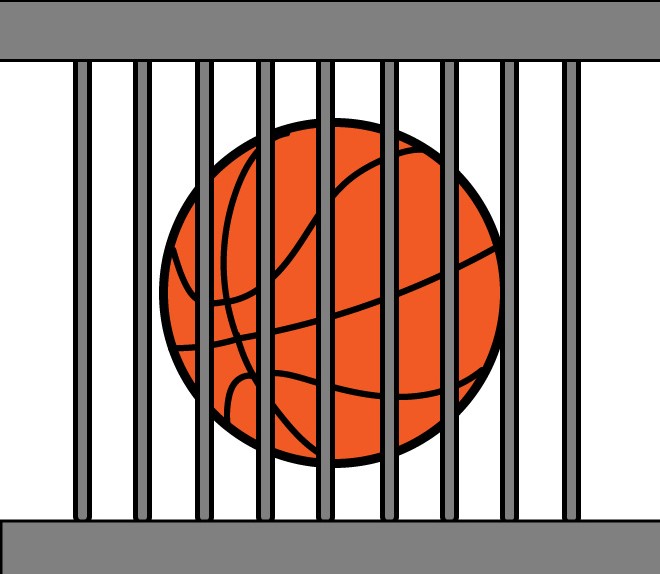Fearful, crushed and remorseful, Brittney Griner, one of the WNBA’s greatest talents, spoke through the bars of her prison cell. As she apologized for her illegal possession of four vape cartridges containing hash oil in Russia, her eyes repeatedly drooped to the ground, her voice monotone with utter defeat. Tightly clutching the bars of the cage, Griner visibly fought back her tears.
“I want to apologize to my teammates, my club, and the fans for the mistake that I made and the embarrassment I brought onto them,” Griner said. “I never meant to hurt anybody. I never meant to break any laws here.”
Griner, a 7-year veteran of a Russian women’s basketball team called UMMC Ekaterinburg, has been detained since Feb. 17, after being arrested at the Sheremetyevo International Airport outside of Moscow. (Sadly, female professionals go there during their offseason to earn the bigger money they don’t get in the WNBA.)
As she pleaded for the ruling not to “end her life” in the prison of Khimki, Russia, on Aug. 4, she heard the court’s decision: a prison sentence of 9 years. She was charged for breaking Article 229.1 of the Russian Criminal Code, which forbids the trafficking and smuggling of illegal drugs.
Griner clearly does not deserve her lengthy prison sentence because of the small quantity of marijuana that she claims she took accidentally. Putin’s regime is exploiting Griner, a prominent figure in the U.S., as a political ploy aimed at highlighting the limitations of American power; however, President Biden needs to alter his approach to free her by offering a different prisoner exchange to Russia and working to help all detained Americans there.
Though it’s natural to feel sympathy for Griner’s plight, it’s also easy to lose sight of the difficult position the basketball star’s actions have put the U.S. in. If the Biden administration fails to get Griner freed, the Russian regime could successfully humble the president by showcasing his foreign limitations, reflecting negatively on the U.S. as a world power. If the Biden administration frees Griner, he will face the domestic backlash of deprioritizing the 40,000 Americans within its borders incarcerated for marijuana offenses, according to Forbes.
Biden has approved a prisoner exchange of convicted arms dealer Viktor Bout in return for the release of Griner and Paul Whelan, a former U.S. Marine who has been imprisoned in Russia for over three years on espionage charges. At face value, this exchange seems fair — though, with some research, the swap starts to become questionable.
In 2012, Bout, nicknamed the “Merchant of Death” as one of the world’s most infamous arms dealers, was sentenced to 25 years in a U.S. prison for terrorism charges. He attempted to sell missiles to a Columbian militant group. Michael Braun, former chief of operations for the U.S. Drug Enforcement Administration, called Bout “one of the most dangerous men on the face of the Earth” in 2010.
Looking deeper into the details of the prisoner exchange, it is imperative for Bout to stay in prison. It is not worth giving up a dangerous asset to terrorist organizations around the world for a high-profile athlete and former Marine.
In addition, there are other Americans stuck in Russia who deserve the president’s attention. Around six months before Griner’s arrest, Marc Hillard Fogel, a teacher and lecturer who taught the children of U.S. diplomats for over 10 years, was arrested in the same Russian airport for possession of a one-half ounce of marijuana in different forms. Though his possession of medical cannabis was approved by a doctor in the U.S., he was still sentenced to 14 years in a Russian prison, five years more than Griner.
However, the president only approved the exchange for Griner and Whelan, ignoring Fogel’s imprisonment even though it happened before Griner’s.
“I support the swap,” Michael McFaul, a former U.S. Ambassador to Russia, wrote on Twitter. “I just hope they include Marc Fogel in the deal.”
Griner should not receive special attention from the U.S. government because she is a high-profile basketball player. As Fogel himself wrote in a letter, “teachers are at least as important as ballers.”
It is important to mention that Griner has written to the president directly, asking him to not forget about the other American detainees. Griner’s advocacy for the other American prisoners abroad is commendable, but it does not change what has actually been proposed. The president has not mentioned any sort of push to free Fogel — in this case, actions speak louder than words.
Now if the president’s efforts to #FreeBrittney — pun intended — succeed, he should spend just as much time attempting to free the 40,000 Americans in jail for marijuana offenses. Perhaps the federal government should direct its attention to the fact that more than 5 percent of arrests in the U.S. are for marijuana possession, according to Newsweek.
Just like any other person, Griner is more than her occupation. She is a wife, a friend and an inspiration to many young female athletes.
“I miss my wife!” Griner said in her letter to President Biden. “I miss my family! I miss my teammates! It kills me to know they are suffering so much right now.”
Griner clearly does not deserve her extremely harsh prison sentence, but releasing Bout in exchange for her freedom would be an error.
Griner’s mistake of bringing marijuana into Russia, should not be compounded by a diplomatic blunder from the president. Let’s not have one mistake lead to another.

























